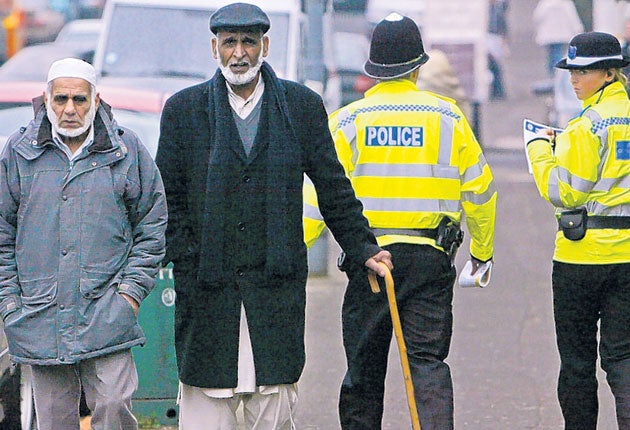Patriotic, respectful and homophobic: a portrait of British Muslims' state of mind
Giant global survey reveals the opinions that shape nation's 2.4 million-strong Islamic population

A startlingly candid snapshot of the views and beliefs of Muslims living in Britain today has been uncovered by the first-ever study of Islamic interfaith relations across the world. The reseach, a collaboration between Gallup and the Coexist Foundation, challenges the view that the country's 2.4 million Muslims are largely intolerant of the British way of life. British Muslims were found to identify more strongly with the UK than the rest of the population, and have a much higher regard for the country's institutions.
However, the poll also found that the vast majority of Muslims have extremely conservative views on moral issues such as homosexuality and the death penalty, which differ dramatically from those held by the rest of the UK population. The wide-ranging study, entitled The Gallup Coexist Index 2009, was based on data collected through polls of residents in more than 140 countries. More than 1,500 interviews were conducted in the UK alone.
77% said they strongly identified with UK
Perhaps the survey's most surprising finding was that more than three-quarters of British Muslims (77 per cent) said they identified "very strongly" with the UK, compared to just half (50 per cent) of the general public. This contradicts the idea that Muslims are outsiders who have little in common with the UK, and is further borne out by a second statistic: 82 per cent said British Muslims were loyal to the country. Professor Ziauddin Sardar, a London-based scholar who specialises in the future of Islam, said that British Muslims with Pakistani or Middle Eastern heritage are all too aware of the troubles in their homelands and can see the UK's benefits better than those who have lived here for generations. "They look at the stability of Britain and appreciate it deeply," he said.
0% thought that homosexuality was morally acceptable
Not a single British Muslim said homosexuality was morally acceptable, compared to 58 per cent of the general public who believed it was. In other European countries with large Muslim populations such as France and Germany, the difference was far less pronounced: more than a third of French Muslims said they did not have a problem with homosexuality.
However, Shelina Zahra Janmohamed, who has written a book about growing up in Britain as a Muslim woman, said the UK's apparently stark contrast did not necessarily point to a divided society. "Part of the British way is that you can have your own opinions as long as you can live harmoniously with others."
76% had confidence in the police
British Muslims were found to have faith in the police, with 76 per cent saying they trusted them compared to 67 per cent of the general public. They were also found to be more likely to have confidence in the Government, the judicial system, financial institutions and the media. "British Muslims and their parents have sometimes had personal experience of societies which are not democratic and where the rule of law is not always followed," said Professor Sardar. "They are not yet disillusioned with the systems of governance, in the way that those who have lived here for generations might be. There is still a lot of expectation."
3% felt that sex outside marriage was morally acceptable
Extra-marital sex was deemed morally acceptable by only three per cent of Muslims, compared to 82 per cent of the general public. And while 15 per cent of the general public considered adultery morally acceptable, only two per cent of Muslims felt the same way. The attitudes of Muslims in France and Germany is very different, where 48 per cent and 27 per cent had no problem with sex outside wedlock. This discrepancy is likely to be caused by the fact that British Muslims mainly originate from rural parts of conservative Islamic countries such as Pakistan, Bangladesh and India, whereas French and German Muslims tend to be from Morocco, Algeria and Turkey, where the culture is different.
63% thought that the death penalty was morally acceptable
More Muslims said they believed in the death penalty than the general public, of whom 50 per cent said they regarded such a policy as morally acceptable. This stance tallies with Sharia law, which allows for both corporate and capital punishment. Sharia still provides a moral framework for many moderate Muslims, and many would have answered this question without hesitation.
3% believed people belonging to other religions threaten their way of life
British Muslims appear to be a lot more tolerant than the rest of the UK population when it comes to accepting other religions. More than a quarter of the general public (26 per cent) said they felt the above statement was accurate. According to Professor Sardar, tolerance of other faiths is an important part of Islam and the handful of British Muslims who felt it was under attack could safely be called extremists. "The vast majority of Muslims believe that Christianity and Judaism are not just viable religions but also contain part of the ultimate truth," he said.
Join our commenting forum
Join thought-provoking conversations, follow other Independent readers and see their replies
Comments